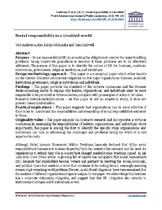Social responsibility in a troubled world
Abstract
PURPOSE– Social responsibility (SR) in accepting the obligation to resolve the many troubling problems facing tomorrow’s generations is essential if those problems are to be effectively addressed. The purpose of this paper is to identify the nature of SR for business, academic institutions, government, religious institutions, and individuals.
DESIGN/METHODOLOGY/APPROACH – This paper is a conceptual paper which relies heavily on the current literature about social obligations for five major organizations: business, academic institutions, government, religious institutions, and individuals.
Findings – The paper provides the standard of the virtuous continuum and the Hosmer decision-making model to explain why leaders, organizations, and individuals must be more responsible to be perceived as virtuous leaders, complete with 50 examples of action to be taken.
RESEARCH LIMITATIONS/IMPLICATIONS – As this paper is not an empirical study, it does not present research information.
PRACTICAL IMPLICATIONS – This paper suggests that organizations can be more effective if they come to understand the responsibilities and stewardship of social responsibilities entrusted to them.
ORIGINALITY/VALUE – The paper expands on Hosmer’s research and incorporates a virtuous continuum in examining the responsibilities of leaders, organizations, and individuals. More importantly, this paper is among the first to identify the specific steps organizations and individuals can take in addressing the challenges and problems facing the world of in key aspects of society.

